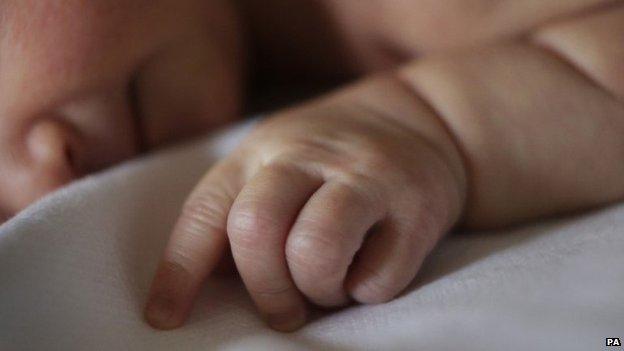Large decrease in number of births, ONS figures show
- Published

The average age of motherhood has reached 30 for the first time since records began
The number of births in England and Wales fell in 2013 by the largest annual amount in nearly 40 years, official figures show.
The Office for National Statistics said live births decreased from 729,674 to 698,512 in 2013, down 4.3% which is the biggest fall since 1975.
The average age of mothers was 30 compared with 29.8 years in 2012.
The "total fertility rate" - the number of children per woman - decreased from 1.94 to 1.85.
'Increasing trend'
The stillbirth rate fell to 4.7 per thousand births from 4.9 in 2012.
More than a quarter of live births were to mothers born outside the UK, an increase to 26.5% compared with 25.9% the previous year.
The annual fall in the total fertility rate (TFR) was also the largest since 1975.
The Office for National Statistics (ONS) report said, external: "Changes in the TFR can result from changes in the timing of childbearing within women's lives as well as any changes in completed family size.
"It is not possible to determine at this stage whether the fall in the TFR and the number of live births in 2013 is indicative of an end to the general increasing trend recorded since 2001. Despite this recent drop, the number of births and the TFR remain high relative to figures for the last three decades."
The report said reasons for the decrease in fertility rates could include uncertainty over employment and career opportunities, and government changes to the welfare system affecting benefits.
The ONS said the number of births had increased every year since 2001 - with the exception of a slight fall in 2009 - rising by 23% between 2001 and 2012.
Outside marriage
The average age of motherhood has reached 30 for the first time since records began in 1938.
The ONS said: "The average age of mothers has been increasing since 1975, with increasing numbers of women delaying childbearing to later ages.
"This may be due to a number of factors such as increased participation in higher education, increased female participation in the labour force, the increasing importance of a career, the rising opportunity costs of childbearing, labour market uncertainty, housing factors and instability of partnerships."
Nearly half of all babies (47.4%) were born outside marriage or civil partnership in 2013. The ONS said this continued a rising trend, with the figure 41.4% in 2003.
Commenting on the report, Ann Furedi, chief executive of the British Pregnancy Advisory Service, said: "The average age of mothers in this country has hit 30 for the first time as many women are deciding to start their families later in life. Mothers are now on average older than women elsewhere in the world when they have their first baby.
"There may be many reasons for this, including the time it takes to achieve educational and professional development, as well as financial security - and it may also be a reflection of how seriously couples take the responsibility of having children in the 21st Century."
Louise Silverton, director for midwifery at the Royal College of Midwives, said the number of births remained "historically high".
She added: "Births are also becoming more complex, for example as the average age of mothers increases. This puts additional pressures on maternity services, and midwives want to give these women the best levels of care. They cannot do that if there are not enough of them."
- Published5 December 2013
- Published8 August 2013
- Published16 September 2013